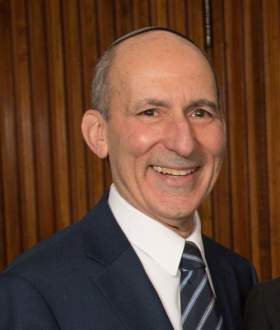
Why be Jewish? Reflecting on the Pew Study, Torah, and Jewish Education
By Dr. Gil Graff
Much has been and will be written about the recently released Pew study of American Jewry. Not surprisingly, the study reflects considerable diversity among American Jews with regard to the meaning of Jewishness in their lives. Among the findings that caught my attention is the following: asked whether the Jewishness of their prospective grandchildren matters to them, 31% of Jews 16-29 years of age indicated that whether or not their future grandchildren are Jewish is “not at all” important.
This response called to mind a series of conversations I had a number of years ago, with a wonderful gentleman interested in commissioning a book for teens and young adults answering the question “why be Jewish?” The individual, an octogenarian at the time I met him, was passionate about the importance of Judaism. He had, over the years, gathered materials that he shared with me that he found quite compelling. He was convinced that, if only young people would explore these things, they would become deeply committed to the importance of Judaism for themselves, their descendants and the world.
He took particular pride in the fact that, thousands of years ago, the prophets of Israel championed values that, today, are bedrocks of western society. The dignity of each person, concern for those who are less fortunate, and a sense of shared responsibility in building a better world are notions that he saw as Jewish contributions to human civilization. If, however, this ethos is, today, commonly shared by people of goodwill -- of many faiths and diverse cultural backgrounds – why be Jewish?
At about the same time I encountered the person interested in sharing the message that Jews and Judaism had introduced noble ideas that have gained widespread currency, Michael Meyer, an outstanding Jewish historian with a distinguished career at Hebrew Union College, wrote an article titled: “Reflections on the Educated Jew from the Perspective of Reform Judaism.” In this piece, Meyer commented: “Once it seemed important to show how Jews were similar to Christians and how Jewish traditions anticipated American values enshrined in the Constitution.” However, “Today it is clear that an educated Jew must know Judaism and Jewish values not only in their relation to Christianity and American culture, but as distinguishable from them.” If there is nothing that is distinctively and uniquely Jewish, Judaism “becomes merely ornamental, if not superfluous.” If Jewishness is simply one ethnic expression of universal values, what difference does it make whether or not someone arrives at those values as a Jew? Put otherwise, why be Jewish?
Answers to that question, as reflected in the Pew study, are quite diverse, depending on one’s understanding of Jewishness and/or Judaism (famously, the Biblical Ruth, a Jew by choice, recognized the twin pillars of ethnicity/nationality and religion as fundamental dimensions of Jewishness, saying to her mother-in-law: “Your nation is my nation; your God is my God”). Jews are sometimes referred to as “People of the Book.” The moniker actually describes a protected status (relative to that of pagans) that Jews enjoyed under classical Islamic rule, as members of a group thought to possess a revealed religion. Though the Torah was not the “latest, greatest” revelation in the eyes of Islam, it was recognized as having sufficient value to endow those who lived by its teachings with protected, though subservient, status in Islamic society. The themes of the Torah, the unique heritage of the “People of the Book,” are a lens through which to think about Judaism and Jewishness; they inform much of Jewish education (knowingly or otherwise); and they offer food for thought in considering the question “why be Jewish?”
In looking at the books that comprise the Torah, one can construct a set of topic headings. Genesis opens with pre-history, expressing notions of God, the world and the role of humankind. Chapters 12-50 might be sub-titled: The patriarchs and matriarchs of the Jewish people and their relationship to the land of Israel, with special attention to lessons from the lives of these early ancestors. The Book of Exodus describes the making of a people with a distinctive sense of purpose and vision of the future arising from a covenantal relationship. Leviticus, sometimes referred to as the Law of the Priests, is in large part a book of ritual, with considerable attention to “kedushah,” distinctiveness (holiness). Numbers relates to living in community, focusing on experiences of the tribes of Israel as they related to one another and as they encountered others, during decades of desert wandering. Deuteronomy, Moses’s closing addresses to the Israelites, emphasizes education; the importance of learning and instructing successive generations in the teachings of Torah, the foundation of an enduring covenant. None of these themes is exclusive to a single book of the Torah; they are intertwined and developed throughout the Torah. They represent a series of central motifs.
Torah is described, near the end of Deuteronomy as the “heritage of the congregation of Jacob.” The Hebrew word for heritage (morashah) comes from the same root as the word inheritance (yerushah). No less than an inheritance, one’s heritage is surely worthy of exploration, though the choice of embracing it and in what way(s) remains with the legatee.
Well-conceived Jewish education engages learners in exploring the themes that collectively comprise the Torah, enabling them to embark on the journey of Jewish living. In each Torah scroll, there are, typically, four blank lines setting apart one book of the Torah from the next. This open area separating the books can, perhaps, be understood as leaving space for the unique ways in which each individual who engages with Torah integrates and applies the themes of the five books to their own life.
As the Pew study reminds us, one can surely identify as a Jew while not embracing all of the above-referenced themes. It might be, however, that what, over time, sustains the “People of the Book” and enables Jews as Jews to contribute to the world of which we are part, is meaningful engagement with the multiple dimensions of Jewishness, as reflected in the Torah. In the words of Michael Meyer: “The Jewishly educated Jew is anchored in Judaism, but that very anchorage enables her or him, without loss of Jewish selfhood, to reach outward to the human community and forward to the universal goal.” Judaism, commented the late Rabbi Jonathan Sacks, “is about how to construct a society that honors the human person as the image and likeness of God. It is about a vision, never fully realized but never abandoned, of a world based on justice and compassion….” The Jewish roadmap toward that vision and its meaning is unique; engaging with it will enrich our own lives and those of our children and grandchildren.
Dr. Gil Graff is the Executive Director at BJE: Builders of Jewish Education

